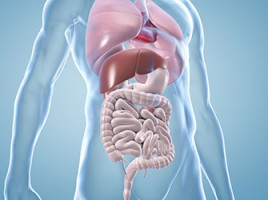
Researchers have identified a correlation between gut microbial composition and microRNA expression in human colorectal cancer, according to a recent study published in the journal mSystems.
The study is the first to demonstrate that the interaction between microRNA and the gut microbiome may play a role in colorectal cancer.
"This is a correlation, but it is still very exciting, because if we see a causal effect, you can think of ways to manipulate the microRNA in the tumours by changing the microbiome, and that could potentially be used as a cancer therapy," said principal study investigator Ran Blekhman, PhD, assistant professor in the Departments of Genetics, Cell Biology and Development, and Ecology, Evolution, and Behavior, at the University of Minnesota, Twin Cities.
The study was performed by Angelo Yuan, a Ph.D. student in the Bioinformatics and Computational Biology graduate program at the University of Minnesota.
The researchers launched their new study for three reasons.
First, recent studies have shown that the microbiome has a role in colon cancer.
Second, many studies have shown that host microRNAs are very important in cancer. Third, recent research has shown that there are interactions between the microbiome and host microRNAs.
"We wanted to look at all of these things together, to see if there is any interaction between the host microRNA and the microbiome in the context of colon cancer," said Dr. Blekhman.
The researchers analyzed colon cancer patient samples collected as part of a previous study at the University of Minnesota.
A total of 88 matched tumour and adjacent normal tissues were collected from 44 patients.
The researchers sequenced the microRNA of these samples and correlated microRNA expression levels in colon cancer tissue with the microbiome composition.
The researchers found that dozens of microRNA are differentially regulated in colorectal cancer tumours, compared to adjacent normal colon, and that these microRNAs are correlated with the abundance of microbes in the tumour microenvironment.
They also found that microbes that have been previously associated with colorectal cancer are correlated with microRNAs (microRNA-182, microRNA-503, microRNA17-92) that regulate genes related to interaction with microbes that likely regulate glycan production, which is important for the recruitment of pathogenic microbial taxa to the tumour.
"We found networks of microbes that are dependent on the microRNA. Then, we specifically investigated the microbes that have been previously linked to cancer, and we identified all of the microRNAs that are correlated with the abundance of these microbes," said Dr. Blekhman. "This is an exciting result, but for now, we have shown correlation. We are currently working to show a direct effect of the microbiome on the microRNA using animal models."
The research provides a first systems-level map of the association between microbes and host microRNAs in the context of colorectal cancer.
Future efforts will aim to detect whether the correlations are causal and if they are, whether there are possibilities to manipulate the microbiome to regulate the expression of microRNAs in the tumour, potentially impacting tumour progression.
The World Cancer Declaration recognises that to make major reductions in premature deaths, innovative education and training opportunities for healthcare workers in all disciplines of cancer control need to improve significantly.
ecancer plays a critical part in improving access to education for medical professionals.
Every day we help doctors, nurses, patients and their advocates to further their knowledge and improve the quality of care. Please make a donation to support our ongoing work.
Thank you for your support.